|
As we celebrate the Nativity of our Lord Jesus Christ at Christmas, I find myself grateful that the Church has established the liturgical calendar in such a way as to help shake us out of our spiritual complacency. The high-points of the Church year—and the larger Christian experience— are referenced so much in our Faith that we may sometimes find ourselves on spiritual autopilot. Before we know it, we might find that solemnities are immediately upon us (or past us), and we feel that we could have benefited from more spiritual preparation. This year, I was looking for a clear and direct theme I could really focus on as Christmas approached. I came across some writings of Venerable Servant of God Fulton Sheen that called to mind certain details of Scripture that my eyes (and spiritual life) might typically gloss over. Recalling the helpless innocence of the Christ-child ready to be born of Mary, Sheen related Mary and Joseph’s plight in searching for late-night shelter in Bethlehem to the lack of hearts open to God which can offer the King of Kings and Lord of Lords a place to dwell and reign:
[W]hen finally the scrolls of history are completed down to the last word of time, the saddest lines of all will be: ‘There was no room in the inn.’ The inn was the gathering place of public opinion, the focal point of the world’s moods, the rendezvous of the worldly, the rallying place of the popular and the successful. But there’s no room in the place where the world gathers. The stable is the place for outcasts, the ignored, and the forgotten… The lesson is: divinity is always where you least expect to find it. So the Son of God-Made-Man is invited to enter into His own world through a back door.[1] With all the seasonal emphasis on gifts and personal generosity, I am especially touched by that first line and the reality that there was no room made available for the arrival of the long-awaited Son of God. How often do we hear calls to be watchful and ready for the Second Coming of Christ; that is, to be repentant of sin and committed to pursuing holiness? This preparation is what the first part of the Advent season is all about. When we are called before the Final Judgement seat of the Most High, and God Himself shows us what we did or did not do for Him[2] in our earthly encounters with the people in our lives, will we say that it was too difficult or inconvenient to take up what we knew was expected of us? All of the baptized are called to be missionary disciples—people who spread the joy of the Gospel by their very lives. We can bring others into an encounter with the Living God—or at least instill a sense of hope, dignity, and love in those who are in need—in the workplace, at home, in our neighborhoods, in our parishes, and within our families. In doing so, we make room in the inn of our hearts for the Christ-child. Without Christ present in our hearts and at the core of our being, we will find ourselves serving a different master—be it vices, worldly pleasures, fleeting successes or honors, or other vanities. Just as the innkeepers of Bethlehem two-thousand years ago declined to open their doors to the Holy Family, so too do each of us have the choice either to be seduced by the empty promises of the world or to pursue a life of holiness and of speaking the Truth among the doubtful, suspicious, hateful, or unrepentant. This Christmas season, let us allow Christ into our lives in order to bring him to others. Let us preach the Gospel with our lives and seek to always make room for him in the inn of our hearts. Christmas is a time for celebration! We rejoice that the Lord God Himself took on human nature and was born as a helpless Child into the world He created in order to free us from sin and death and invite us to live with Him forever. The occasion of Christmas encourages each of us to be a welcoming soul to the Lord rather than one who closed their doors to the Holy Family that holy night: Joy to the world, the Lord is come! Let earth receive her King! Let every heart prepare Him room. And let it begin with me. Amen. [1] Sheen, Fulton. “Life of Christ” (1954). [2] cf. Matthew 25:40.
0 Comments
We have entered the season of Advent and a new liturgical year. Advent offers us an important time for us to watch, wait, and reflect on the coming of Jesus Christ, on our encounter with him. He is encountered in the mystery of the Incarnation, which we represent by Nativity scenes placed in our churches, chapels, and homes. We can stop at the beauty of the artistic scene and not move ourselves into deeper reflection on the fact that God, who is infinite love and mercy, sent his only begotten Son to save us.
Christ is also encountered in the Eucharist, most significantly during the celebration of the Mass. Pope Francis describes this coming of Jesus: “Mass is prayer; rather, it is prayer par excellence, the loftiest, the most sublime, and at the same time the most ‘concrete’. In fact, it is the loving encounter with God through his Word and the Body and Blood of Jesus. It is an encounter with the Lord.” (General Audience, November 15, 2017). And Christ will come again in all his glory at the end of time. We need to be prepared for this time not simply through passive waiting, but by active watching for the Lord and encountering him in our brothers and sisters who are most in need, especially the poor, the vulnerable, and the voiceless (Mt. 25:31-46). As baptized members of the Body of Christ, we are co-responsible for the mission that he left us until he comes again – for the salvation of souls – not only focusing on eternal life with God, but also on how we are collaborating with the Most Holy Trinity to build the Kingdom of God on this side of life. Pope Francis reminds us of the connection of the Immaculate Conception to the salvific plan of God. “In the Immaculate Conception of Mary we are invited to recognize the dawn of the new world, transformed by the salvific work of the Father and of the Son and of the Holy Spirit. The dawn of the new creation brought about by divine mercy. For this reason, the Virgin Mary, never infected by sin and always full of God, is the mother of a new humanity. She is the mother of the recreated world.” (Homily for the Solemnity of the Immaculate Conception, 2015) We have not been conceived without sin, but we have been washed clean of Original Sin at Baptism (and all prior sin, if one was baptized as an adult). While we have all sinned since that time, our Baptism offers us a share in the mission of Jesus Christ as Priest, Prophet, and King. Though followers or disciples, he also sends us as apostles, or as missionary disciples, out into our challenging world to witness to him by what we say and do. That is why we are told at the end of each Mass to “Go”. We are sent on mission by Christ and the Church as joyful witnesses of God’s love and mercy. Our best example of how to be a missionary disciple of Jesus Christ is the Blessed Virgin Mary. She followed Jesus as his disciple unfailingly during her life and continues from her heavenly home as Queen of Apostles to invite us to encounter her Son, Jesus Christ, Our Savior and Lord. May the Charity of Christ urge us on! The Catholic Apostolate Center is a ministry of the Immaculate Conception Province of the Society of the Catholic Apostolate (Pallottine Fathers and Brothers). The Pallottines and the Center staff will remember you in special prayer on this Solemnity of the Immaculate Conception. We’re well into the first week of Advent, and if you’re like me, you’re probably sick of all the Christmas displays and music and consumerism that has bombarded our senses since November started. As an American, it’s always been easy for me to get pulled into the secular world’s excitement about Christmas, its eagerness to get started with all the partying, eating, gift swapping, caroling, and general Christmas cheer. But as I’ve deepened my faith as a Catholic, I have found that the more focus I put on Advent as a time of preparation for Christmas, the easier it is to block out the unending secular Christmas noise and ready my heart, my home, and my family for the coming of the Christ child. For most people, the phrase “preparing for Christmas” probably evokes memories of setting up Christmas trees and hanging lights outside, wrapping gifts, or organizing the ideal Christmas classics playlist. And while those things certainly count as preparation for Christmas, won’t we suffer burnout—or what I have seen referred to as “the holiday hangover”—if we spend all of November and December with our house decked out for Christmas and with Christmas music playing all day long? I know I would. A few years ago, as I was researching Catholic Advent traditions that I could incorporate into my family’s liturgical life, I decided that I ought to shift our emphasis from when to set up the Christmas décor and instead focus on the spiritual longing and the growing excitement for the arrival of the Messiah. Traditionally and liturgically, Christmastide lasts many days—at the very least until the Epiphany, but usually until the Baptism of the Lord. Why not leave the Christmas celebrations until Christmastide and focus on the preparation during Advent? Israel spent countless years in hopeful anticipation of the savior—is it really so difficult for me and my family to spend four weeks emulating that same sense of joyful expectation? The Catholic Church has so many symbols and traditions from which we can draw to prepare our hearts and homes for Christ. In our house, we not only light the Advent wreath every night, but we darken the dining room lights in order to emphasize the light that Christ brought when he came into the world. We also recently implemented the Jesse Tree—a tradition I did not grow up with, but one that I have come to love because it condenses salvation history into a timeline that is easy even for my children to follow. We don’t listen to Christmas music during Advent, choosing instead to listen to Advent music. We read children’s books that discuss the animals’ preparing the barn before the Nativity, or the journey that Mary and Joseph took before Jesus was born. When we experience Advent in this way, the anticipation for Christmas builds with each passing week. As Christmas Day draws closer, we start baking and freezing the Christmas cookies to be eaten during Christmastide and to be given as gifts at Christmas parties. I take time to plan out special activities for us to do during the twelve days of Christmas, or special meals I know everyone will enjoy during that time. We pray the O Antiphons. We make or buy gifts for our loved ones, and we talk about how giving gifts to our loved ones is a reflection of the great gift of Jesus, who was given to us on Christmas Day. In this way, when we finally decorate the house on Christmas Eve, we are all practically bouncing with excitement—and not just about presents, but about the miracle of Christ’s birth. Our children’s—and our own—sense of wonder is bolstered and preserved by our not celebrating too early. By steeping ourselves in the history of the first Christmas and by maintaining that same sense of watchful hoping and waiting, we can more fully appreciate the wonder of the arrival of the promised Messiah. 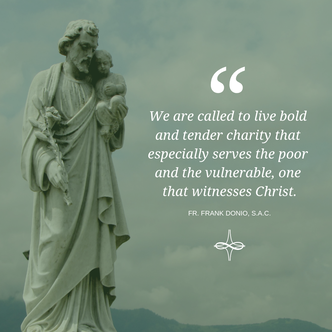 March 19th marks the Solemnity of St. Joseph, Spouse of the Blessed Virgin Mary and Patron of the Universal Church. These are rather lofty titles. He has many others. I first came to know St. Joseph, not only through the Nativity story, but because he was the patron of my parish church in Hammonton, New Jersey. As a child, I would look at the statue of St. Joseph to the right of the main altar and saw a wise looking, older person holding the child Jesus. His face was kind and tender, yet strong. Only later did I admire the work of the artist who was able to capture the essence of St. Joseph. Pope Francis, whose sixth anniversary of the inauguration of his ministry as pope is also on March 19th, reflected on these and other aspects of St. Joseph and what they mean for us: “In the Gospels, Saint Joseph appears as a strong and courageous man, a working man, yet in his heart we see great tenderness, which is not the virtue of the weak but rather a sign of strength of spirit and a capacity for concern, for compassion, for genuine openness to others, for love. We must not be afraid of goodness, of tenderness!” (Pope Francis, Homily, March 19, 2013) Charity or love, St. Thomas Aquinas tells us is “to will the good of the other.” (CCC, 1766). Goodness is not simply about being polite. It is much more than that. It is an opportunity to live love of neighbor in a way that is strong and bold at times. It is a way of showing love of God. Consider what St. Joseph did for Mary in taking her into his home (Mt. 1:24) or in moving the family to Egypt at a moment’s notice (Mt. 2:14). These were in response to God’s invitation to do so – an invitation that came in dreams. We are called to live bold and tender charity that especially serves the poor and the vulnerable, one that witnesses Christ. This is at the heart of the Lenten practice of almsgiving. It is this type of charity that “urges us on” as St. Paul tell us (2 Cor. 5:14). Pope Francis witnesses it, St. Vincent Pallotti lived it, and we are all called to do the same. May the Charity of Christ urge us on! "Christmas is joy." -Pope Francis What is the joy of Christmas? It is the joy of our encounter with Jesus Christ! There is plenty of manufactured joy that is fleeting, especially during the Christmas season. The joy that we experience in the love of Christ, though, is eternal. It is not simply happiness in a thing or a moment. Our joy is the Good News of salvation in Christ, the Incarnate One, Emmanuel, God-with-us. Look at a scene of the Nativity of Jesus Christ. In that humble moment, God comes as an infant child for one reason and one reason only, for us to have the opportunity for salvation. The rarely sung third verse of the Christmas carol, O Holy Night, reminds us of the joy and freedom that come from Jesus Christ: Truly He taught us to love one another; His law is Love and His gospel is Peace; Chains shall he break, for the slave is our brother, And in His name all oppression shall cease, Sweet hymns of joy in grateful Chorus raise we; Let all within us praise His Holy name! Christ is the Lord, then ever! ever praise we! His pow'r and glory, evermore proclaim! His pow'r and glory, evermore proclaim! We at the Catholic Apostolate Center pray that you may experience the joy, freedom, love, and peace of our Lord and Savior Jesus Christ at Christmas and always!
The candy has gone on sale, the post-Thanksgiving “leftover sandwich” has been eaten, but it’s not time to deck the halls just yet. As many prepare for the joyful season of Christmas, complete with mall Santas, holiday movies, and plans to celebrate the Nativity of Jesus Christ, the Church prepares during the season of Advent. This time isn’t just for buying gifts and putting up the tree, but to prepare ourselves spiritually for the coming of Christ. This season of preparation can be traced back to 4th century France, though the Advent we are familiar with can be traced back to Pope Gregory I and Rome in the 6th and 7th centuries. Whereas Lent is a time of penance for Christians, Advent is a time of preparation and hope. Not only do we prepare for the birth of the Lord, but we also look to the Second Coming of Christ. The first coming of Jesus at Christmas opened the doors for our salvation and prefigures his Second Coming. It is because of this hope that Advent focuses on light and not darkness. This light can be symbolized in the Advent wreaths that adorn Churches and the houses of the faithful. The four candles represent the four weeks of Advent, three purple and one rose. The purple candles represent prayer and sacrifices that are undertaken in preparation for the coming of Christ. The rose candle, lit on Gaudete Sunday (the third Sunday of Advent), is a symbol of rejoicing as the faithful have reached the midpoint of the season. When we thank God for the forgiveness of our sins and for the chance to be with him for all eternity in Heaven, we often think of Easter, but Christmas is necessary in the plan for our salvation as well. Before Christ could suffer and die for us, achieving our redemption and the path for our salvation, he had to become man. What a gift this is! If you follow the Franciscan theology of the incarnation as proposed by Bl. Duns Scotus, Christ would’ve become man with or without the original sin of Adam and Eve, but his mission of salvation makes his Incarnation that much more special for us. As Pope Benedict XVI said at a General Audience, “[Bl. Duns Scotus] reaffirmed that the Incarnation is the greatest and most beautiful work of the entire history of salvation.” Jesus, the God of all the universe, became man. But he did not just become a man—he became a vulnerable baby born in a manger. As we encounter him every time we partake in the Eucharist, let us pray and meditate upon the fact that God became vulnerable for us. God loved us so much that he became man. Years after his birth in a manger, he took on our sins so that we may be with him forever. Just as we prepare to receive him into our bodies when we receive the Eucharist, let us prepare to receive the Lord into the world this Advent and make ourselves more worthy of him. Advent is our time to come closer to Christ, to meditate on how he is present in our lives, and to see how he has called us to live with our fellow man as we await his Second Coming. While prayer, fasting, and almsgiving are certainly emphasized during the season of Lent, they can also be integral parts to our preparation for Christmas. May we pray for Christ to be present in our lives and for us to do his will at all times; may we fast from the things that lead us away from him; and may we give alms to those who are less fortunate than us. In these ways we prepare for Christ during Advent as we await both his Nativity and his Second Coming. Question for Reflection: What are some Advent traditions that have helped you prepare for the coming of Christ? For more resources to help you throughout the Advent season, please click here. While Christmas is still some time away, the circumstances surrounding the birth of our Lord give reason for us to pause and reflect throughout the year on the great mystery of the Incarnation—the entering of God the eternal Son into time and the human experience. At the Christmas vigil, the Gospel proclamation involves tracing the ancestral lineage of Jesus as “the son of David, the son of Abraham” and the prophetic culmination of divine promises. Those specifications, similar to the grand announcement of The Nativity of the Lord from the Roman Martyrology, draw upon Sacred Scripture to formally declare the birth of Christ and squarely place His entry into time. The USCCB notes: “It begins with creation and relates the birth of the Lord to the major events and personages of sacred and secular history. The particular events contained in the announcement help pastorally to situate the birth of Jesus in the context of salvation history.”
Reflecting on the genealogy of Jesus helps us to remember that he is part of a human family and was raised with particular role models and inherited traditions. It also reminds us that many people helped prepare the way for the coming of the Savior, playing greater or lesser roles for the glory of the Father’s plan. Two people who are part of Jesus’ genealogy, but passed over in Scripture are the parents of the Blessed Mother, Sts. Joachim and Ann. Factually, nothing about the parents of Mary arises from credible historic sources apart from their existence — not even their names of Joachim and Ann are verified! Although they are passed over in Scripture, Mary’s parents are critical as they represent generations who actively participated in the obligations of family and faith life while anticipating the coming of the Messiah. These saints maintained the spiritual and familial environment that nourished and inspired the Blessed Mother to always trust in God and to famously declare, “May it be done to me according to your word.” We find evidence of Mary’s strength of character and trust in the Lord in Scripture, especially Luke chapter 1 verses 28-55 and John chapter 2: Mary is steadfast in making decisions, active in prayer, obedient to the laws of her faith, calm through moments of crisis, and devoted to her relatives. It is not hard to see how such models of parenthood would likely have inspired Mary’s own upbringing of Jesus. We can wonder how much of Mary’s unyielding belief through Jesus’ ministry, Passion, and Resurrection — especially after seeing her son publically brutalized and murdered — was instilled in her by the fortitude and strength she saw modeled by her own parents during her childhood. What can we learn from the parents of the Blessed Mother? We may not all be grandparents, but we can still influence our families through our receptiveness to the perspectives, experiences, and lessons of those preceding us. Truly these are treasures of wisdom not to be taken lightly or ignored. Pope Francis has sought to convey this important observation. During his first World Youth Day as Pope, observing that Brazilians were celebrating Grandparents Day on the feast of Sts. Joachim and Ann, he reflected: "How precious is the family as the privileged place for transmitting the faith! … How important it is to have intergenerational exchanges and dialogue, especially within the context of the family … Children and the elderly build the future of peoples: children because they lead history forward, the elderly because they transmit the experience and wisdom of their lives." The family is often the first community of love, knowledge, and faith that we experience (CCC 2205). It is a great gift to preserve and strengthen that takes our time, talent, and commitment to keep strong. Yet, just as each of our family members are imperfect, so too is our own love despite our best intentions. At times we may lose patience amidst the demands of life. Or, more tragically, we may find ourselves amongst family members who do not know how to love, perhaps products of their own troubled upbringings. When we face difficulties within our families, or see hurt in other intergenerational families, let us remember that regardless of our human relations, we have been born into the spiritual family of the Church. How wonderful it is that despite our earthly circumstances each of us has been entrusted to call God our Father, Mary our Mother, Joachim and Ann our grandparents and Jesus our Brother and Savior. Sts. Joachim and Ann, pray for us! Questions for Reflection: Who are the people in my family who have taught me the beauty of the faith? Which members of my family need me to show them the love of Christ? My husband and I lingered in the Church a tad longer than usual the last Sunday of Christmas. We were taking in the beauty of the liturgical season—the lights, trees, colors, the Nativity—ultimately basking in the hope that is born from the Word made Flesh who dwells among us. To be frank, we were also lamenting the season of Ordinary Time that was next, followed by the Lenten Season. We were lamenting the transition from the hope-filled season of Advent into the Lenten journey that leads to Good Friday, where the babe in the manger becomes the suffering servant on the Cross. With Advent lasting for the shortest amount of time this year, and Lent approaching quickly thereafter, I find I am still reflecting on the Mysteries of the prior Christmas season. I suppose I am still sitting in my parish church reflecting on the Wise Men bringing the Child Jesus gifts, reflecting on the idea that a child caused conversion. Highly educated adult men encountered a baby in a stable for animals, and this encounter prompted a change of heart. I would prefer to stay in that time of hope and joy rather than enter into the gore and the sacrifice of the Passion. A few weeks ago, I was reading a reflection in the Magnificat, a daily Mass companion, about the conversion of the Thief on the Cross. The author mentioned that the thief went through a conversion upon encountering the Lord, bloodied, beaten, on the verge of death. The author asks, “What is it that brought the conversion to the thief?” Jesus was in a position of shame, and yet the thief sought repentance and salvation. How could this be? Jesus as the Messiah would have been hard to believe based on His appearance and vulnerability on the Cross, particularly to a thief who had lived a life worthy of crucifixion. Jesus as a child wrapped in swaddling clothes and Jesus on the Cross have the ability and desire to convert souls. Jesus is Lord in every season. He wants our hearts. Christmas seems so beautifully packaged; it can appear that Jesus as a child is sweeter, warmer, more approachable. Yet the story of the Good Thief shows that Christ can also be approachable in his ability to suffer with and for mankind. The thief’s conversion on the cross invites us to approach the bruised and beaten Lord with our own trials and hardships. I was fearful to head into the darkness of Lent, forgetting that Jesus wants to be with us, in His vulnerability, even in our difficult times. Whether we are fleeing suffering, undergoing trial, or in a stagnant time spiritually, we must not put limits on Jesus’ desire for closeness with us, especially as we enter into the season of Lent. If you are struggling with the beginning of the Lenten season, desiring to stay back in the light and joy of the Christmas season like my husband and I, remember that Jesus wants to enter into your Lenten journey, into each season of your life. If you open yourself to him as the Good Thief did on the cross, he can and will grab your attention and be present to you during this season of fasting and preparation. Let us pray for hearts that are open to God’s graces during Lent, open to an encounter and conversion with Christ during every season of the heart. Question for Reflection: Are you struggling to enter into the Lenten season? How can you more deeply invite Christ into your Lenten journey? Click here for resources to accompany you throughout your Lenten journey. This is such a rich time for us as Catholic Christians! Within the past month, we’ve begun a new liturgical year, celebrated in praise and thanksgiving the Nativity of our Lord, the Holy Family, and the Blessed Virgin Mary, and we continue to celebrate as we approach the Epiphany of our Lord. It is quite difficult to wrap our hearts and minds around the richness that has been available to us over these past four weeks in the midst of the hustle and bustle of the holiday season. Among the chaos of planning and celebrating, we have also rung in a new calendar year. 2017— with its successes, failures, struggles and triumphs—has come to a close and we stand at the precipice of 2018. We all know what that means: New Year’s resolutions. Are you hoping for more control over your health, finances, or career? Perhaps you are hoping to find more time to pray and manage stress in your life. What is it that you are hoping to gain control of this year or to do more regularly? As we prepare to choose and implement changes that we would like to make in our lives, let us not forget that we are still in the midst of celebrating the Word made flesh, Emmanuel. The change and possibility of a baby, born in a humble manger, is reflected in the beginning of a new year. Is our gaze still fixed on the babe in swaddling clothes? What would 2018 bring if instead of resolving to gain control of our lives, we truly allowed the Messiah to be Emmanuel, God with us. Jesus is waiting for each and every one of us to echo the “yes” that was uttered by the Holy Family as they welcomed Him into their lives. What if instead of resolving to control everything, we resolved to say yes to that tiny baby born of a Virgin? During one of the Advent homilies at our parish, our pastor challenged us to think about times we have attempted to be the messiah of our own lives by trying to grasp or control various situations or circumstances. During this time of change and resolution, it can be tempting for us to forget that we are not the Messiah as we make plans and goals for the upcoming year. As I reflect on this, I am reminded of the words of the hymn “These Alone Are Enough” by David Schutte, based on the Suscipe prayer of St. Ignatius of Loyola: “Take my heart oh Lord. Take my hopes and dreams. Take my mind with all its plans and schemes. Give me nothing more than your love and grace. These alone, oh God, are enough for me.” It is good and just to strive to improve our character and to foster good and healthy habits in our lives. However, instead of resolving to do it on our own, by the gift of that blessed Christmas morning, we have the choice to freely give all of these things over to the One who makes all things new. As you stand at the threshold of this New Year and envision your hopes and dreams for 2018, take a moment to reflect on what these possibilities could become if you allowed them to be infused by the abundant grace of God. It is still the Christmas season. There is still time to approach the manger. Take the leap of faith. Instead of resolving to gain control, approach the manger and resolve to say YES and to be transformed! Resolve to offer the babe in swaddling clothes your mind, your heart, your body, and soul. As you boldly step out into 2018, my prayer for you echoes the words of Saint Paul, “May the God of peace make you perfectly holy and may you entirely, spirit, soul, and body, be preserved blameless for the coming of our Lord Jesus Christ. The one who calls you is faithful, and he will also accomplish it.” Question for Reflection: What are some resolutions you can hand over to the Lord this New Year? When we think of this time of year, we may call to mind images of a family gathered around the hearth, presents under the tree, and perhaps a nativity set illustrating the upcoming celebration of the birth of Christ—one of the central events in salvation history. We are, however, not quite at Christmas; we are still in the final days of Advent—the holy four-week period of preparation and expectation. Around this time two thousand years ago, the Holy Family was facing the uncertainty of finding shelter before the imminent birth of Jesus Christ. They would not have been thinking of gifts or carols or greetings of the season; all that mattered was securing a safe place for Mary to deliver her child.
In his work, Life of Christ, the Venerable Servant of God Fulton J. Sheen observed, “When finally the scrolls of history are completed down to the last words in time, the saddest line of all will be, ‘There was no room in the inn.’” While the Roman census had decreased the amount of vacancies throughout Bethlehem, Sheen continued, there would always be accommodations for those who could pay a certain amount. The Holy Family carried with them not merely gold or silver, but the eternal King of Kings; however, all that was offered to them was a back-end stable. What king would ever be born of such humble origins? Jesus came into the world unknown to most scholars, rulers, and other great people, apart from the Magi. Yet His mission was infinitely greater than what the world expected. In these final Advent days, I invite you to refresh the spiritual hospitality of your hearts. Our hearts are where our Lord comes to dwell in us. We hear the Word of God and see it in action every day, but if we are to build upon that in our lives, we must take steps to ready our hearts to welcome Christ. And since Jesus promised that He would “prepare a place for [us]” in His Father’s house, how faithfully should each of us take the steps to tend to the throne room of our hearts from which He shall reign over our lives? “Prepare the way of the Lord,” the prophet Isaiah cries out. Spiritually preparing, refreshing, purifying, and maintaining our hearts is a process which endures throughout our entire life. It is a part of the universal call to holiness extended to each of us. Just as the Incarnation of God was first made known to the childlike and foreigners, so too are all people called to prepare their hearts as an inn to receive the Most High God Who humbled Himself and took on our human nature. Jesus, the Son of the living God, earnestly and lovingly desires to dwell in our hearts. What an unfathomable honor and blessing this is! He will never force His way into our lives but patiently waits for us to invite Him into the place shaped by our faith, words, thoughts, and deeds. We must make room for Him in the inn of our heart. When Christ finally does come may we be vigilant and ready to welcome Him to dwell in our hearts and lives forever. We have entered the season of Advent and a new liturgical year. Advent offers us an important time to watch, wait, and reflect on the coming of Jesus Christ and on our encounter with him. He is encountered in the mystery of the Incarnation, which we represent by Nativity scenes placed in our churches, chapels, and homes. We could limit ourselves to only looking at the beauty of the artistic scene and not move into deeper reflection on the fact that God, who is infinite love and mercy, sent his only begotten Son to save us.
Christ is also encountered in the Eucharist, most significantly during the celebration of the Mass. Pope Francis describes this coming of Jesus: “Mass is prayer; rather, it is prayer par excellence, the loftiest, the most sublime, and at the same time the most ‘concrete’. In fact, it is the loving encounter with God through his Word and the Body and Blood of Jesus. It is an encounter with the Lord.” (General Audience, November 15, 2017). And Christ will come again in all his glory at the end of time. We need to be prepared for this time not simply through passive waiting, but by active watching for the Lord and encountering him in our brothers and sisters who are most in need, especially the poor, the vulnerable, and the voiceless (Mt. 25:31-46). As baptized members of the Body of Christ, we are co-responsible for the mission that he left us until he comes again – for the salvation of souls – not only focusing on eternal life with God, but also on how we are collaborating with the Most Holy Trinity to build the Kingdom of God on this side of life. Pope Francis also reminds us of the connection of the Immaculate Conception to the salvific plan of God. “In the Immaculate Conception of Mary we are invited to recognize the dawn of the new world, transformed by the salvific work of the Father and of the Son and of the Holy Spirit. The dawn of the new creation brought about by divine mercy. For this reason, the Virgin Mary, never infected by sin and always full of God, is the mother of a new humanity. She is the mother of the recreated world.” (Homily for the Solemnity of the Immaculate Conception, 2015) We have not been conceived without sin, but we have been washed clean of Original Sin at Baptism (and all prior sin, if one was baptized as an adult). While we have all sinned since that time, our Baptism offers us a share in the mission of Jesus Christ as Priest, Prophet, and King. Though followers or disciples, he also sends us as apostles, or as missionary disciples, out into our challenging world to witness to him by what we say and do. That is why we are told at the end of each Mass to “Go”. We are sent on mission by Christ and the Church as joyful witnesses of God’s love and mercy. Our best example of how to be a missionary disciple of Jesus Christ is the Blessed Virgin Mary. She followed Jesus as his disciple unfailingly during her life and continues from her heavenly home as Queen of Apostles to invite us to encounter her Son, Jesus Christ, Our Savior and Lord. May the Charity of Christ urge us on! The Catholic Apostolate Center is a ministry of the Immaculate Conception Province of the Society of the Catholic Apostolate (Pallottine Fathers and Brothers). The Pallottines and the Center staff will remember you in special prayer on this Solemnity of the Immaculate Conception. When was the last time you thought about St. Joseph? For many, he is a shadowy figure. And yet, he is recognized as the "protector" of the Church. His feast day is March 19th. What's your image of Joseph? Is he young or old? Is he working or sleeping? Is he rich or poor? Is he strong or weak? We invite you to clear away all those images in order to see him for the first time. Let's meet Joseph as he is presented to us in the Gospel of Matthew at the birth of Jesus. Of course, the best thing to do is to pray with Matthew 1:18-25. Here’s the abbreviated version: Mary and Joseph are engaged. She is expecting. He intends to divorce her quietly but learns, in a dream, that she is carrying a son who will "save his people from their sins" (Matthew 1:21). Joseph is told to accept Mary as his wife and name the child Jesus. In this passage, we see four qualities in Joseph—compassion, righteousness, fidelity, and decisiveness—that make him a saintly man and a role model for us today. Imagine how Joseph felt about Mary's pregnancy. The marriage customs of his day were much different than ours. Were they "in love" or was the engagement arranged? Perhaps Joseph felt more hurt than angry—or perhaps disappointed, given Mary's natural innocence. In any case, he responded with compassion; He did, however, want to do what is right. While he never says a word in the Gospel narrative, Joseph's actions continually say "yes" to God's will. He takes Mary into his home as his wife. He honors Mary's special relationship with God by not having "relations with her until she bore a son" (Matthew 1:25). He claims Jesus as his son by naming him. Joseph lived a quiet fidelity expressed in action rather than words. A kind-hearted man who accepted the mystery of salvation entrusted to him, Joseph adopted Jesus and raised him as his own. He protected him, taught him, and loved him. In the Gospels, Jesus is known as "the carpenter's son." Joseph's love for Mary and Jesus sharpened his awareness of the forces around them. When Herod threatened the life of Jesus, Joseph leapt into action, leaving that night for Egypt. When the threat was gone, he brings Jesus back to his people. When he realized some threat remained, he settled in Nazareth, thus fulfilling a prophecy. His actions were always for the good of Jesus and Mary, and ultimately a part of God's plan for salvation. As we get closer to Joseph, we meet a kind-hearted man, walking humbly with his God, as he accepts, protects, and raises Jesus so that Jesus can "save his people from their sins." St. Joseph can shed considerable light on what it means to be a missionary disciple in an increasingly secular age—with implications for the economy, family, and mission. He plays a quiet, but essential, role in salvation history. Perhaps we, too, have a quiet role to play in salvation history. Perhaps Jesus is relying on us just as he relied on Joseph. Compassion, righteousness, fidelity, and decisiveness can help us live out our role just as they served Joseph. What does the word adoption mean to you? Joseph's vocation began with a dream—a message from God. He is commanded to "rise, take the child" as his own. When we engage the world, do we possess it or does the world possess us? Do we adopt friends, jobs, things—even children, seeing them through the eyes of God? Adoption is a way of being in the world. We are adopted children of the Father in Christ Jesus. We are claimed by God and so we, too, can claim others and make them our own - being possessed in the best sense of the word. Joseph adopted—Jesus, Mary, and his life as a carpenter in fidelity to God who, with and through Jesus, was saving the world. St. Joseph, pray for us.
There’s something to be said for silence. In the absence of vocalizations or other sounds, one can focus more intently in his or her surroundings. At first, it may seem uncomfortable, especially if one is usually talkative and used to a noisy environment. At the same time, one might have difficulty focusing his or her thoughts in silence, suddenly having to contend with an onslaught of mental distractions. Especially in today’s society, one is constantly bombarded with external messages, symbols, and other stimuli in a magnitude never encountered previously. In one way or another, we have become numb. We now find ourselves nearly halfway through Advent, a period of reflection, meditation, and waiting in anticipation of the solemn celebration of the nativity of our Lord. While the rest of the culture may be focused on shopping for gifts and decorating for the holidays, the faithful are called to contemplate the gift of Love made incarnate in a most humble setting over two thousand years ago. Throughout the liturgical year, but especially during this time of Advent, I find that removing myself from the demands of the world and replacing them with the stillness of Bethlehem is not only refreshing, but also an effective catalyst for drawing more deeply into the mystery of the Incarnation: “the Word became flesh and dwelt among us.” (John 1:14) How can silence help us dwell in this mystery? For one, sacred Scripture contains numerous accounts of how effective silence is for drawing one nearer to God and neighbor. Actually, one of my favorite biblical passages illustrates the friends of the greatly afflicted Job sharing in his miseries through their silent presence: “They sat with him on the ground seven days and seven nights, and no one spoke a word to him, for they saw that his suffering was very great” (Job 2:11-13). God is not just with us, however, in moments of suffering or, on the opposite side of the spectrum, moments of majestic power and glory. God’s love continuously invites us to draw near to Him in our daily lives as well. Remember that the prophet Elijah experienced God in the sound of a gentle breeze blowing, not in the preceding bursts of wind, earthquake, or fire (1 Kings 19:11-13). While silence can be beneficial to one’s spiritual life, it itself is not the end of contemplation or meditation. Rather, the focus remains, as it is for all prayer, communication with God. Silence, then, is a medium for encountering God, just as music or the spoken word is employed in liturgy. There are times when words are insufficient or music fails to strike the right chords. In these cases, a silent presence can be the most appropriate expression of closeness, such as in hospice, a cemetery, nursery, hospital, or any other place where the ministry of presence is desired. Similarly, as I prepare myself for a Holy Hour of silent adoration before the Lord in the Blessed Sacrament, I remind myself of the importance of placing myself before God’s presence. Sometimes, a tender gaze of love can be a beautiful prayer in itself. As we continue to wait and reflect during the beginning of the new liturgical year for Christmas, let us pray to be able to free our minds from the things of this world that may distract us from seeking our “heavenly peace,” that is, union with God, the Word Incarnate, Emmanuel. For it was indeed a silent night, as the carol goes, during which our Savior came into this world and the shepherds and magi adored him. The wonder and awe of the miracle had passed over the scholars and authority figures and was instead “given to the childlike” to experience and behold for themselves (Matthew 11:25). In silence, our joy is not diminished, nor is our love any less potent, but through it we can continue to focus our attention and energy towards adoring the King of Kings and Lord of Lords: Jesus Christ, true God and true man. "During those days Mary set out and traveled to the hill country in haste to a town of Judah, where she entered the house of Zechariah and greeted Elizabeth. When Elizabeth heard Mary’s greeting, the infant leaped in her womb, and Elizabeth, filled with the holy Spirit, cried out in a loud voice and said, ‘Most blessed are you among women, and blessed is the fruit of your womb. And how does this happen to me, that the mother of my Lord should come to me? For at the moment the sound of your greeting reached my ears, the infant in my womb leaped for joy. Blessed are you who believed that what was spoken to you by the Lord would be fulfilled.’" -Luke 1:39-45
Year after year, we hear this reading in the days leading up to Christmas. As we prepare for the day on which we celebrate the Son of God entering the world, we tend to hear this passage and focus on Elizabeth’s words: “How does this happen to me, that the mother of my Lord should come to me?” and “blessed are you who believed.” Rightfully so, we concentrate on Mary’s fiat and, thus, the beginnings of the life of the one who would save us all. However, we may tend to overlook another thing Elizabeth exclaimed: “the moment the sound of your greeting reached my ears, the infant in my womb leaped for joy.” John the Baptist would go on to be the great “forerunner of Christ.” As we commemorate the Feast of the Nativity of John the Baptist, we remember that it was he who prepared the way for Jesus’ ministry. John preached the coming of the Kingdom of God to the thousands that flocked to the desert to hear his preaching. It was he who baptized Christ in the Jordan, thus anointing him for his ministry. John the Baptist’s own ministry goes back to the moment when John, in his mother’s womb, hears the voice of Mary calling. That voice is not just that of a young woman, but a young woman who is the Mother of God. Thus, John, leaping in Elizabeth’s womb, seems to be recognizing and acknowledging the fact that the Lord Himself is present in Mary’s womb. Several years ago, then-Pope Benedict XVI made a comparison to John’s leap for joy: “Mary, expecting the birth of her Son Jesus, is the Holy Ark that contains the presence of God, a presence that is a source of consolation, of total joy. John, in fact, leaps in Elizabeth’s womb, just as David danced before the Ark.” Benedict reminds us of the scene in 2 Samuel 6 when David dances excitedly as the Ark of the Covenant is brought into Jerusalem. In both cases, the Word of God is physically present. Before John, the Word is Jesus in the womb of Mary. Before David, the Word is in the form of the Ten Commandments within the Ark. For them, being in the presence of the Lord was not something they took lightly. They were not afraid or saddened, they were filled with a joy so immense and so uplifting that the only way they could express themselves was by jumping and dancing. These Biblical events point to the line at the heart of Pope Francis’ exhortation: “The joy of the gospel fills the hearts and lives of all who encounter Jesus.” Faith in Jesus, who is the Word of God incarnate, is not something that should bring us down. It is not something that should feel like an overwhelming burden. When we go to a sports game or another competition, for example, we sit on the edge of our seats, waiting and hoping that our side will come out on top. When our team scores, we jump to our feet and cheer loudly. We clap and sing and even shed some tears. How much more, then, are we call to be excited when we are in the presence of God in the Eucharist or spreading the Good News to those we encounter? We are invited to witness to our faith gladly, for we believe in a God who loved us so much that He gave His only son to die for our sins so that we might be able to have eternal life with Him (cf Jn 3:16). That kind of love reminds us to live our life of faith happily. Pope Francis once commented, “I cannot imagine a Christian who does not know how to smile.” He was correct. How could a true believer exemplify the love of God with a frown? Let us follow the examples of David and John the Baptist who show us that true faith does not bring about sadness or dread, but instead brings us joy and peace. When we encounter someone who may challenge our beliefs, do not yell and scream back, but face that opposition with grace and a smile. When we go to Mass and notice that those around us may be mumbling their way through the hymns, I invite you to sing loudly and proudly, remembering that you are glorifying God. And when we get tired in our faith lives, let us be reminded of Christ’s love and sacrifice for us and, like John the Baptist, “leap for joy” ourselves. Victor David is a collaborator with the Catholic Apostolate Center and a staff member at The Catholic University of America in Washington, DC. 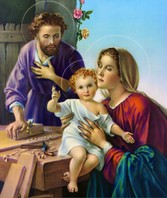 Christmas is on Friday. Wait, really?! Have we bought all of our presents? Are we ready for a Christmas feast? Is work ever going to end? These are the thoughts that plague us right now, but what we really should be asking is: are we ready for the birth of Christ? Advent is almost over - was there really enough time to prepare for the birth of the Son of God? The short is answer is 'no,' and the long answer is still 'no.’ But we know that as we prepare each liturgical year we take another step on the long journey toward Christ. Each celebration gives us the chance to refocus on that journey and draws us back into living out our faith wholly and fully. Who better to help us refocus our sight on Christ than the Holy Family? The Holy Family is the PERFECT example for us as we share in similar struggles. Through the Incarnation, Jesus became man and we believe him to be both fully human and fully divine. In a beautiful way his humanity is formed by Mary and Joseph. Who better to relate to then Mary and Joseph themselves? They were there when they thought Jesus was lost in the temple and there throughout his adolescence. Mary was there to inspire him to begin his ministry at Cana and was there as her son gave up his life for us. During Advent and Christmas we are watching Mary, Joseph, and Jesus grow and become a family. We should take this opportunity to allow ourselves to walk in their footsteps and live a life wholly committed to Christ. We should take this opportunity to ask for their intercession and assistance on our journey to God. Please do not think that their example only applies to families! Their example applies to each and every Catholic, Christian, non-Christian, and human being. The virtues that they live in the Bible are virtues that we should all be living. Look to how Mary and Joseph interact and form Jesus and open yourself up to them. No matter where we are in life we can learn from their unwavering commitment and their steadfast love. I challenge you to think about someone in your life who embodies these qualities: “unwavering commitment” and “steadfast love.” I only have to think back to last week at my father-in-law’s funeral. My wife was delivering the eulogy and said, “[he] reminded me of the importance of the ‘virtue of selfishness,’ as he so called it. This means that you can take control of how you feel, and you must take care of yourself so that you can take care of others. If you have nothing to give, what then are you authentically giving?” He got it. He understood that God is calling us to form ourselves in our faith, to root ourselves in him because we cannot lead others to God without first opening ourselves to his grace. How do we do this? We commit ourselves to Christ with steadfast love. This Advent, as we are preparing for the birth of Christ, let us remember to ground ourselves in his love so that as the new year comes we can go out and evangelize the world. Let us also remember Saint Pope John Paul II’s words on the Holy Family: “I wish to invoke the protection of the Holy Family of Nazareth…it is therefore the prototype and example for all Christian families…St. Joseph was a “just man”…may he always guard, protect and enlighten families. May the Virgin Mary, who is the Mother of the Church, also be the Mother of “the Church of the home”…May Christ the Lord, the Universal King, the King of Families, be present in every Christian home as He was at Cana, bestowing light, joy, serenity, and strength”. Nicholas Shields is a young professional working in Washington, DC.
|
Details
Archives
July 2024
Categories
All
|
About |
Media |
© COPYRIGHT 2024 | ALL RIGHTS RESERVED

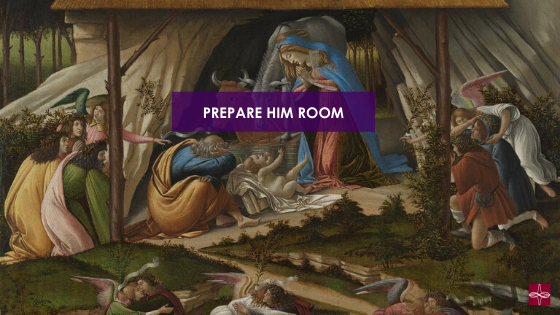

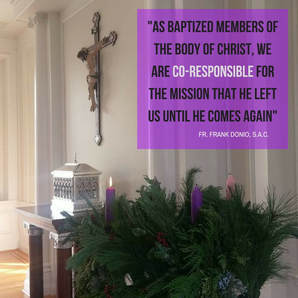
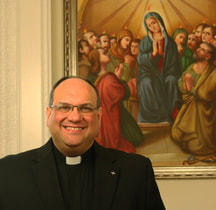
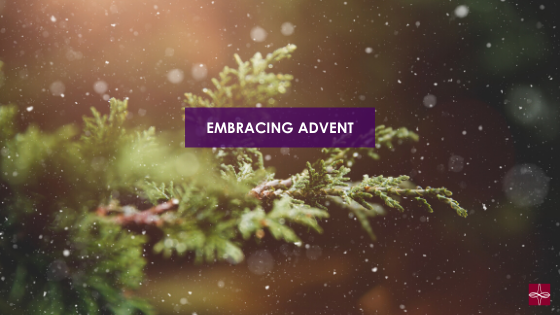

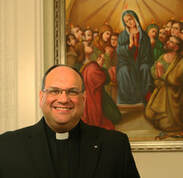
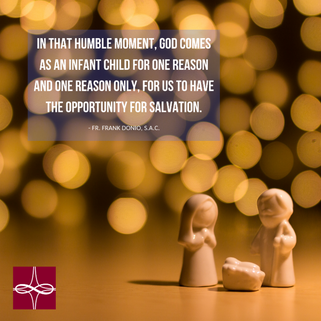
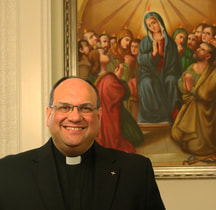
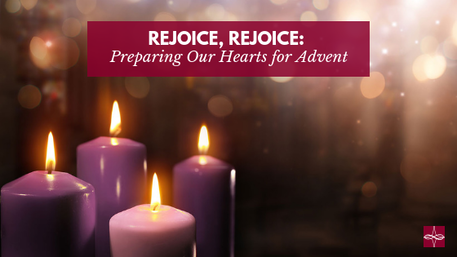

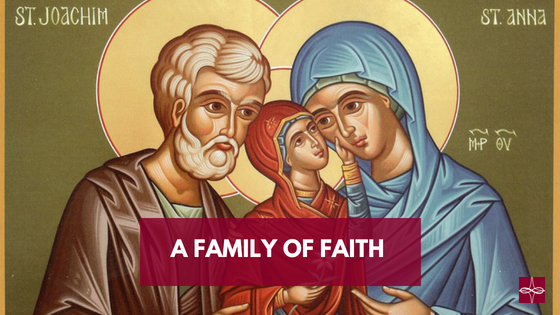

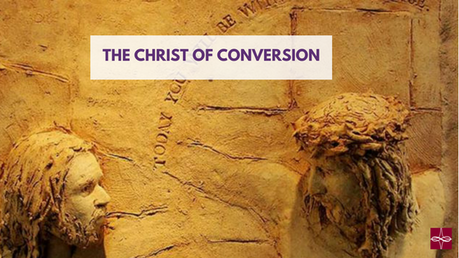



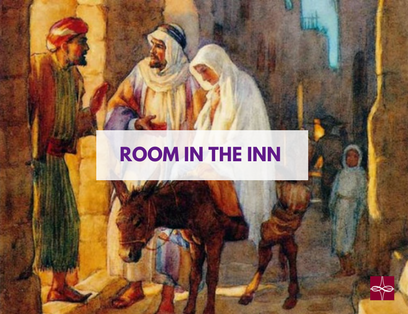

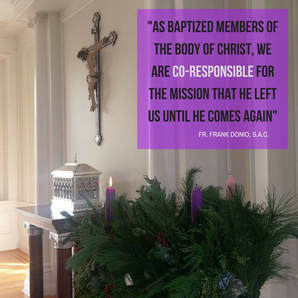
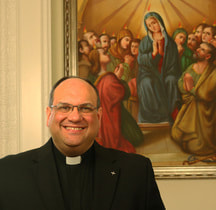
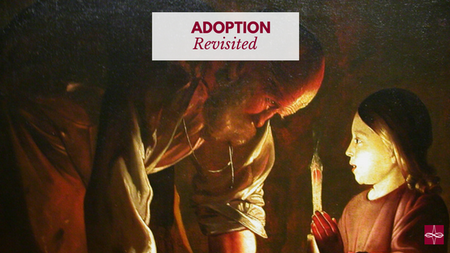



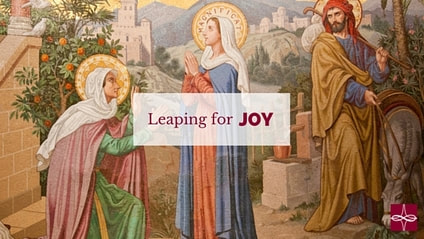
 RSS Feed
RSS Feed